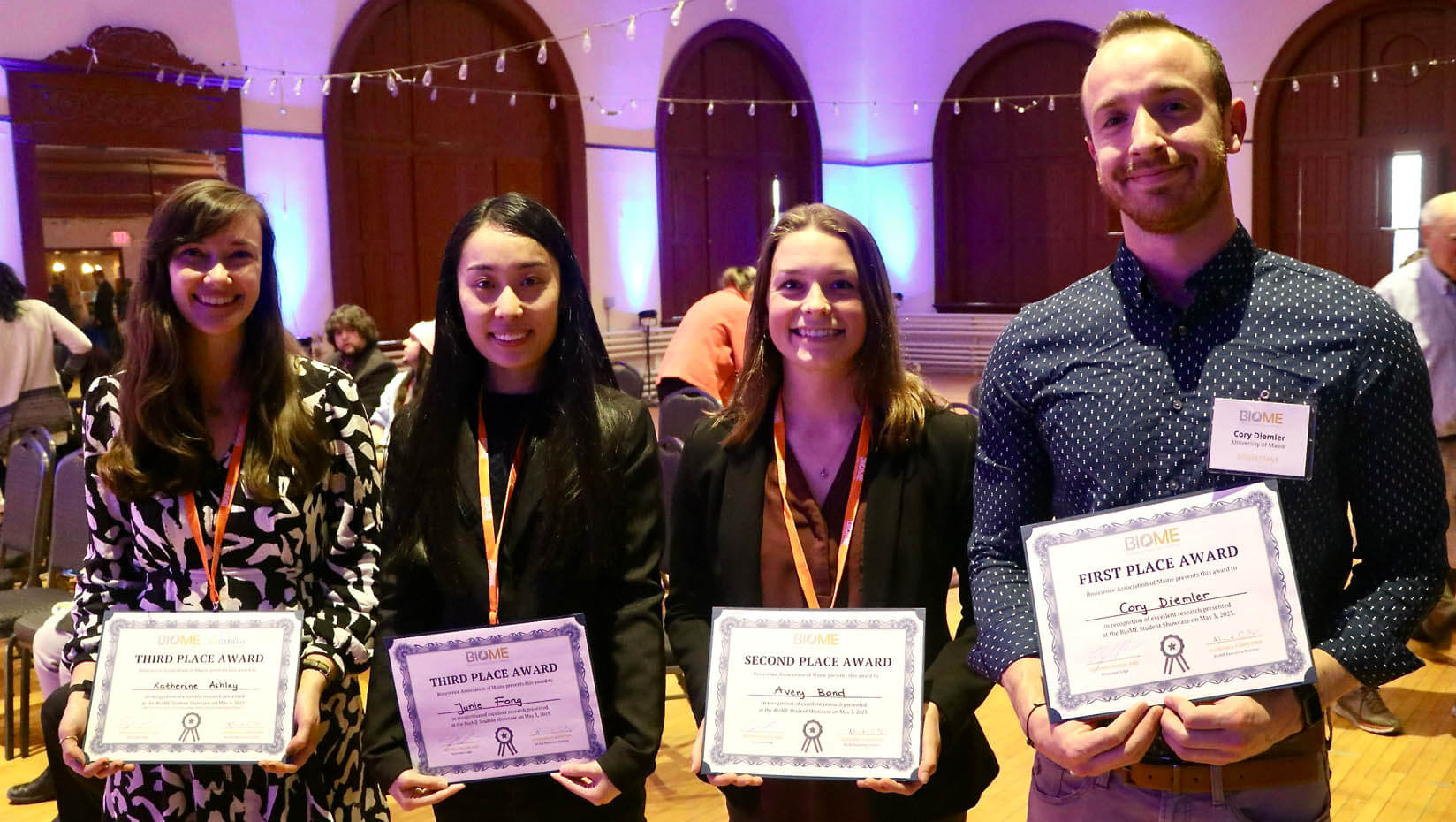
Four UMaine Ph.D. students win top awards in 2023 BioME showcase
Four University of Maine Ph.D. students won the top awards in the college division of the 2023 Bioscience Association of Maine (BioME) Student Showcase on May 3.
The annual competition tasks college and high school students, who participate in separate divisions, with presenting life-science focused research projects to win cash and academic prizes. According to BioME, eight college students, all from UMaine, delivered three-minute presentations and answered in-depth questions from judges. Caitlin Howell, a UMaine associate professor of bioengineering, served as a judge for the high school division.
Cory Diemler, a Ph.D. student in biomedical sciences, won first place for a project titled “TREM2 Microglia: An Alternative Therapeutic Target for Glaucomatous Neurodegeneration.” Avery Bond, a Ph.D. student of microbiology, won second place for her project titled “Blocking host-cell calcium signaling pathways: a potential antiviral target for JC polyomavirus infection and beyond.”
Junie Fong, a Ph.D. student in the Graduate School of Biomedical Science and Engineering, and Katie Ashley, a plant science Ph.D. student, tied for third place with their projects titled “Creating Efficient Anti-Bacterial Surfaces on Catheters with Antibiotic-Free Liquid Coatings” and “Repurposing lobster shell waste as a disease suppressive soil amendment in potato production,” respectively.
Diemler, a native of Ohio, received his bachelor’s from Ball State University and his master’s degree at the University of South Florida. At USF, Diemler began his research into neurodegenerative diseases, looking at mechanisms to improve learning and memory in the face of cognitive impairments. He then went to The Jackson Laboratory in Bar Harbor to study alternative therapeutic targets against neurodegenerative diseases, like glaucoma and Alzheimer’s disease. Now he is a predoctoral associate at the lab, and there he studies the molecular mechanisms that underlie the retinal ganglion cell loss associated with glaucoma.
“This was an amazing opportunity to present work that I am excited about,” Diemler says. “BioME inspiring young potential scientists to, not only showcase their research, but also encourage scientific development within the state is incredible, and something I wish I had when I was younger, in my home state. It was really exciting to see all the fantastic work and passion of the other participants in the area.”
Bond, a Jefferson, Maine native, researches virus-host cell interactions, specifically between JC polyomavirus and human brain and kidney cells, under the guidance of Melissa Maginnis, associate professor of microbiology. Prior to attending UMaine, she earned her bachelor’s degree in medical biology from the University of New England in 2019. She won the Best Presentation in Biomedical Sciences by a Graduate Student award at the 2021 and 2020 UMaine Student Symposiums.
“BioME creates so many rewarding opportunities for students in the life sciences in Maine to practice their science communication skills, both oral and written,” Bond says. “I am thrilled to have had the chance to present my thesis research at the BioME Fast Pitch Competition. Compressing years of research into a three-minute pitch is a fun challenge that allows researchers to practice relaying their topics and findings in an easy-to-understand fashion. Plus, it’s always great to hear about other exciting ongoing research in the state!”
Fong, of Hong Kong, is developing novel liquid surface coatings on human catheters, which may reduce protein deposition that leads to urinary tract and bloodstream infections, in the laboratory of Howell. She earned both her bachelor’s and master’s degrees from Hong Kong University of Science and Technology. Fong also is collaborating with Howell and Japhet Murenzi, a MaineMBA student, on commercializing the research. Their project, PROCatheter, is a bio-inspired coating that reduces the risk of infection by hindering protein and bacterial adhesion to the catheters. The project is supported by the university’s MIRTA accelerator program.
“I am thrilled to have the opportunity to share this fascinating scientific idea with the audience and promote the progress of my project,” Fong says. “The fact that my work has garnered attention fills me with happiness, as it has the potential to significantly improve the well-being of many individuals. This experience has equipped me with valuable knowledge and skills in delivering precise and impactful presentations that resonate with the audience. This ability to effectively communicate my project’s goals and outcomes is a crucial skill set that I have gained throughout this process.”
Ashley, a native of Vero Beach, Florida, studies biologically-based methods to cultivate soil microorganisms that can suppress diseases in potato crops under the guidance of associate professor Jianjun Hao. She also earned her master’s degree at UMaine and her bachelor’s degree at the University of Central Florida.
“Participating in the BioME Student Showcase was a wonderful opportunity to share my research in a short format of only three minutes,” Ashley says. “I’m honored to be able to work towards overcoming real world challenges with innovative solutions in my research everyday. At this event, it was especially inspiring to see the work of my peers, fellow up and coming scientists working to make the world a better place.”
The goal of the BioME Student Showcase is to support the innovation and commercialization of student ideas in Maine, and connect students with potential future employers and entrepreneurial resources in the state.
Contact: Marcus Wolf, 207.581.3721; marcus.wolf@maine.edu
